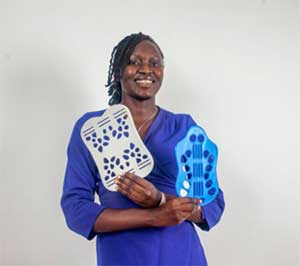Young Woman Ignites a 3D Printing Revolution in The Gambia

BANJUL, The Gambia, May 11 (IPS) - In the heart of The Gambia, an intrepid young woman called Fatou Juka Darbor is blazing a trail for women fuelled by her fiery passion for STEM (Science, Technology, Engineering and Mathematics).
Her remarkable journey led her to co-found the country’s first and only 3D printing company - Make 3D Company Limited - in 2019, breaking boundaries and inspiring future generations.
Fascinated by machines from a young age, Juka was determined to uncover their inner workings, taking apart radios and calculators with unbridled curiosity.
“I always wanted to know what makes things work,” she says.

The young entrepreneur’s drive to build a career in STEM propelled her to overcome the challenges women often face in this male-dominated sector, brushing conventional norms aside. “In The Gambia, women were often discouraged from pursuing careers in STEM, as it was seen as a male-dominated field,” she says with a laugh.
Her unwavering dedication made her the only woman in her mechanical engineering class at the Gambia Technical Training Institute.
Reflecting on this journey, she says: “My experiences of the stigma attached to being ‘the woman’ in a male-dominated space made me realize how lucky I was to have parents that supported my decision to pursue sciences.”
Juka’s determination culminated in a prestigious role as a mechanical engineer at the Gambia National Petroleum Company.
Her ambitions, however, continued to soar. In 2019, she partnered with Silvestr Tká?, a tech enthusiast, to create Make 3D Company Limited, introducing the revolutionary world of 3D printing to The Gambia.
“The fact that a young woman like me is co-running this business and growing it so quickly shows how capable Gambian women are if given the chance and the support,” Juka says.
Her company has been a catalyst for change, improving the lives of Gambians. During the COVID-19 pandemic, for example, her Make 3D Company Limited collaborated with the Gambian Medical Research Council Unit (MRCG) to create protective equipment for frontline healthcare workers.
This innovative approach garnered partnerships with the United Nations through the International Trade Centre (ITC) and the UN Development Programme (UNDP), manufacturing over 8,000 face shields for the country’s primary referral hospital.
Additionally, Juka’s company has developed prosthetic limb prototypes, offering affordable solutions and newfound hope to those who have lost their limbs due to accidents, diseases, or conflicts.
Juka’s steadfast commitment and resolve have garnered her numerous accolades, solidifying her status as a pioneer in her field.
Her message to young girls is unequivocal: “I hope I inspire young girls in Dumbutou and Basse to believe that they can be anything they dream of being. No career is specifically meant for men only. You can be whatever you want to be if you believe in yourself, even if no one does.”
The UN in The Gambia is supporting initiatives to bridge the gender disparity gap in STEM. Through events such as the ‘UN Women and Girls in Science Day,’ the UN raises awareness about the obstacles women and girls face in STEM and offers capacity-building support to women-owned businesses.
Juka’s uplifting tale of courage and resilience amidst adversity is a potent reminder that, given the right opportunities and support, women can excel in STEM fields and leave a lasting, positive impact on their communities.
Abdoulie Badjie is the Programmes Communications and Advocacy Officer in the UN RCO in The Gambia, while George Lwanda is the Head of UN RCO in The Gambia.
Source: Africa Renewal, United Nations
IPS UN Bureau
Follow @IPSNewsUNBureau
Follow IPS News UN Bureau on Instagram
© Inter Press Service (2023) — All Rights Reserved. Original source: Inter Press Service

